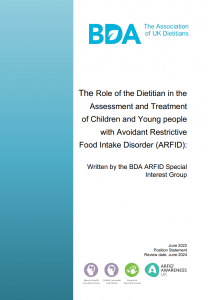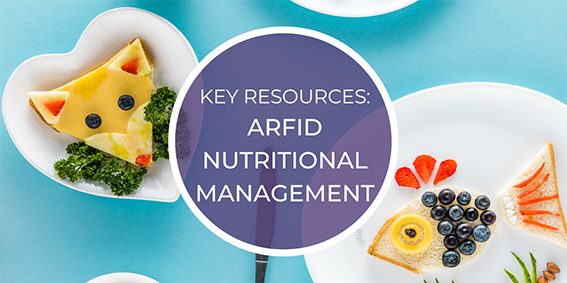Following on from our webinar on ’ARFID – Nutritional Management’, we’ve pulled together some of the key resources and references discussed within the webinar. If you missed the live webinar, you can register to watch the recording.

GUIDELINES AND REPORTS
ARFID Position Statement (2022). British Dietetic Association.
Diagnostic and Statistical Manual of Mental Disorders (DSM-5-TR) (2023). American Psychiatric Association.
International Classification of Diseases for mortality and morbidity statistics (11th Revision) (2018). World Health Organisation (WHO).
RESEARCH PAPERS
Avoidant/ Restrictive Food Intake Disorder and Autism Spectrum Disorder: Clinical Implications for Assessment and Management (2021). Farag et al. Clinical and neurodevelopmental presentations of children with avoidant/restrictive food intake disorder (ARFID)
Towards an evidence-based out-patient care pathway for children and young people with avoidant restrictive food intake disorder (2021). Bryant-Waugh R et al. Proposed evidence-informed framework for care
Macro- and Micronutrient Intake in Children with Avoidant/Restrictive Food Intake Disorder (2021). Schmidt et al. Those with ARFID met only 20-30% RNI most micronutrients
Vitamin D levels of the healthy infants using oral spray or drop form of vitamin D supplement in the first year of life (2021). Unsur et al. Study findings suggest that the infants using oral spray form have higher VD levels compared to oral drop form
Peeking into the future: Transdermal patches for the delivery of micronutrient supplements (2021). Grammatikopoulou G M et al. The transdermal delivery seems promising with regard to nutritional supplementation
Nutritional Deficiency Disease Secondary to ARFID Symptoms Associated with Autism and the Broad Autism Phenotype (2020). Yule S et al. Qualitative Systematic Review of Case Reports and Case Series
Cognitive-Behavioral Therapy for Avoidant/Restrictive Food Intake Disorder: Children, Adolescents, & Adults (2019). Thomas et al. There is no evidence-based psychological treatment suitable for all forms of ARFID at this time
arshman et al. Our results support the need for diet diversification as part of therapeutic interventions for ARFID to reduce risk for nutrient insufficiencies and related complications
Growth and body composition in children who are picky eaters (2019). Taylor et al. A The prevalence of thinness amongst some picky eaters is notable, suggesting that some children may need specific early identification, intervention and growth surveillance.
BDA ARFID SPECIALIST INTEREST GROUP (SIG)
Sub-group of the BDA Child and Adolescent Mental Health (CAMH) specialist group
ARFID AWARENESS UK
ARFID: An Introduction to diagnosis and management – Training Course
SOCIAL MEDIA
@thorntonwood (Twitter) and @claretwdiet (Instagram) for Clare Thornton Wood (webinar speaker)
@PaedDietitian (Twitter) and @rosanpaediatricdietitian (Instagram) for Dr Rosan Meyer (webinar chair)
RELATED MYNUTRIWEB CONTENT
Eating Disorders in the Community (2022). Webinar with Priya Tew
Let us know if you find this resource blog useful and if you have any recommended resources about ARFID.
Please consider supporting us to help fund our mission in providing high quality CPD learnings.








